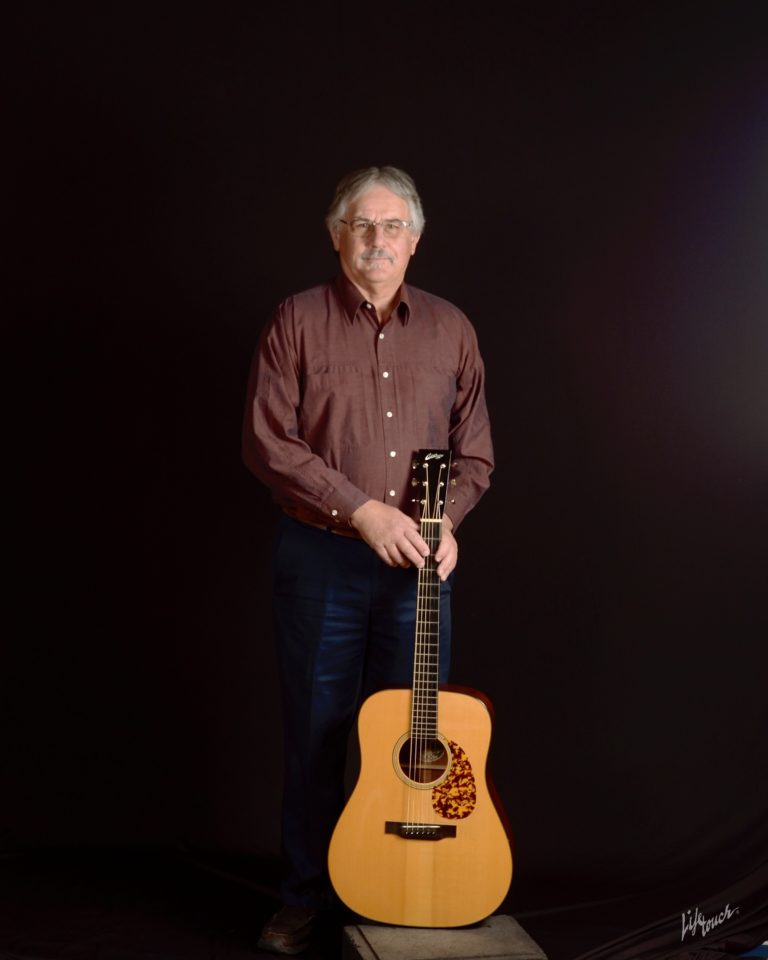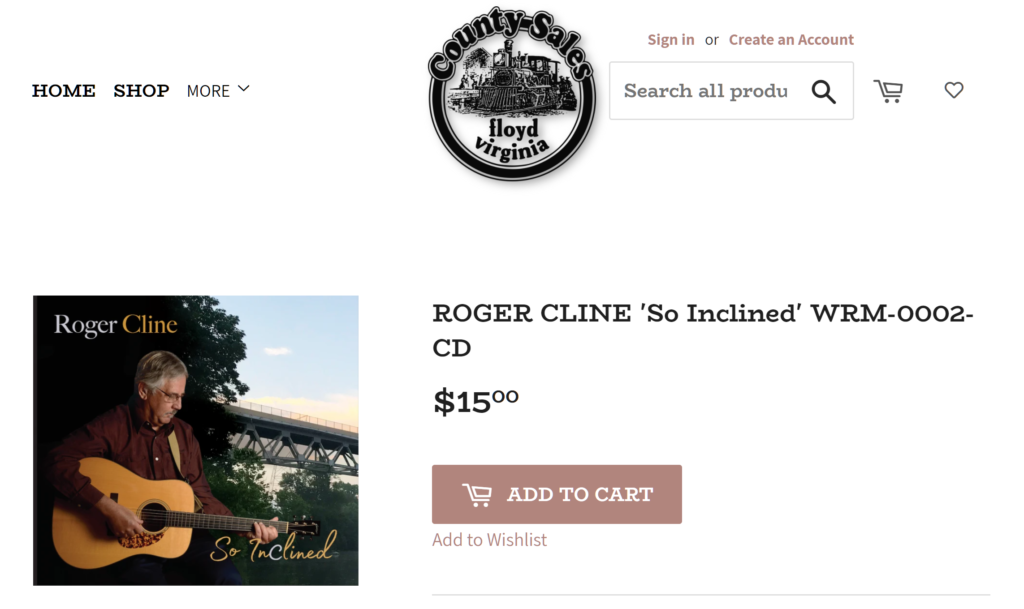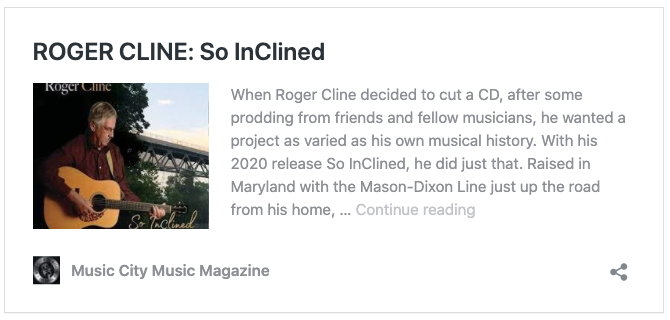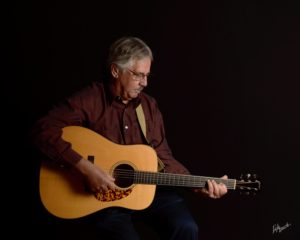
Songs (Click to play)
Information
All songs:
Ⓒ Walnut Run Music (ASCAP)
except as noted:
¹ Ⓒ SouthernMelody Publishing (BMI)
² copyright control
³ Ⓒ Glenwood Music Corp (BMI)
Producer: Johnny Williams
Executive Producer: Debbie Durant
ⓟ 2020 Walnut Run Music LLC
P.O. Box 113
Landenberg, PA, 19350
www.rogerclinemusic.com www.walnutrunmusic.com
Reviews
County Sales
Roger Cline is a guitarist and songwriter who calls Jarrettsville, Maryland – a tiny hamlet located forty miles north of Baltimore – home. He grew up in the 1950s and ‘60s with exposure to his parents’ country music collection. As a teen, the acquisition of an electric guitar and amp sent him on a decades-long journey through rock and roll. It wasn’t until the 1990s that he rediscovered bluegrass music and has spent the last two decades exploring his acoustic side. So InClined is Cline’s first solo outing and it is a solid showcase for his singing and songwriting talents; his name appears on ten of the disc’s thirteen tracks. Among the covers is a nice rendering of the Country Gentlemen’s “Come and Sit By the River.” The arrangements range from middle-of-the-road bluegrass to ones that display Cline’s wizardry on the guitar. He has a pleasant voice and has surrounded himself with like minded pickers and singers; Jeanette and Johnny Williams and banjoist Jody King are but a few of talented musicians lending their talents to the project. – Gary Reid
Track List:
- You Fell From The Sky
- Why Do You Treat Him Like You Do?
- Soul of a Soldier
- Easy Street
- Come and Sit By The River
- At the Journey’s End
- Lover’s Moon
- The Wind and the Waves
- Monarch Evening
- Flat River Girl
- Maple Leaves
- The Distant Shore
- The Outlaw
Bluegrass Today
Roger Cline is an example of an artist whose passion for music was instilled at a young age. The country music that formed an essential part of his parent’s record collection offered him his initial inspiration, and eventually led his mother to buy him his first guitar. Although he was first attracted to rock and roll, bluegrass eventually took over his interests, and for the past 30 years or so, his passion has accelerated exponentially, culminating in his aptly named new album, So Inclined.
Still, it’s one thing to be an admirer, and quite another to be an artist who’s able to take those lessons and translate them in ways that reflect his or her own singular style. Clearly then, Cline is not only capable of evoking his influences, but also able to write songs and make music that resonate with memorable melodies and adroit execution. You Fell From the Sky and Why Do You Treat Him Like You Do set an upbeat tone early on, but by the time the third song of the set, Soul of a Soldier, rolls around, it becomes apparent that Cline’s craft also extends to an ability to share soul-stirring sentiments in the midst of the tender trappings. The instrumentals Easy Street and The Distant Shore become an ideal showcase for his supple fretwork, while two other songs, the cheery Come and Sit by the River and the lilting Flat River Girl, spotlight his skills on mandolin as well.
That said, Cline’s has an able supporting cast to accompany him, including an array of harmony singers and ace instrumentalists. That’s a positive reflection of both his savvy and skillset. When he turns the lead vocal on the quiet, caressing At the Journey’s End over to Jeannette Williams, there again, the album nods to a more touching tone. Cline matches those soothing sentiments with his own gentle read of the soothing Lover’s Moon, and the easy, ambling The Wind and the Waves.
Consequently, Cline’s established a personal protocol that ensures an emotional bond. His commitment to cause is obvious, but the fact he was able to solidify his stance so early on speaks to both his skill and savvy. It’s not only a fine first step, but also a major leap forward.
Bluegrass Unlimited
Marylander Roger Cline began playing guitar in the late ‘60s, eventually turning to bluegrass and acoustic music in the ‘90’s. He began writing songs and also picked up the mandolin. On this debut project, Cline features his songwriting, his singing and playing and is accompanied by a number of his friends and other talented players.
Cline is backed on most cuts by Nick Goad (mandolin), John Boulding (resonator guitar), Billy Hawks (fiddle), and Debbie Durant and Tom Hensler (bass) are on various cuts. Other players include Tom Beers (mandolin), Colleen Craven (guitar), Michael Gaudreau (bodhran, strumstick & bones), Dennis Hertzog (fiddle), Jody King (banjo), Andy McIntyre (bass), and John Scott Walker (banjo). Harmonies on various cuts include Beers, Craven, Durant, and Jeanette Williams, Johnny Williams.
Ten of the thirteen cuts were written or co-written by Cline. Cline is an excellent guitarist throughout, especially on the instrumentals “Easy Street,” “Monarch Evening,” and “The Distant Shore.” Many of the songs have Gospel or spiritual themes including “Why Do You Treat Him Like You Do?,” “The Wind And The Waves,” “Maple Leaves,” and “The Outlaw” with just guitar.
Jeanette Williams sings a beautiful lead on “At The Journey’s End.” Cline’s love songs are “You Fell From The Sky,” “Lover’s Moon,” and “Flat River Girl.” Cline’s very pleasant voice is backed by this collection of well written songs, great arrangements and solid playing.
REVIEWED BY Bill Foster
Music City Music Magazine
When Roger Cline decided to cut a CD, after some prodding from friends and fellow musicians, he wanted a project as varied as his own musical history. With his 2020 release So InClined, he did just that.
Raised in Maryland with the Mason-Dixon Line just up the road from his home, Cline was influenced early by his parents’ record collection—Johnny Cash, Ernest Tubb, Hank Williams, Tennessee Ernie Ford. Even before he can remember, they took him to Sunset Park where he remembers watching the stage from atop his father’s shoulders. He says he doesn’t remember the names of the musicians, although his dad and mom told him they saw Cash there, but he does remember that they all had their names written up the frets of their guitars in pearl.
Before long, playing the record player wasn’t enough to satisfy his musical urges, so Cline bought a guitar at the local furniture store, one that still hangs on the wall in his office. He took lessons for about a year to get started learning to play and hooked up with his guitar teacher’s son, a drummer, to start a band, playing junior high school dances at the local teen center.
When the band started veering away from rock and roll, Cline took up the bass and played in several other bands.
“We played a lot of good music, but we never made any money, of course,” says Cline. His last year of high school he joined a friend’s band playing what he called “music for the older generation”—a lot of country, a little bit of pop rock and such songs as “I Left My Heart in San Francisco.” It wasn’t rock and roll, he says, but it was good experience.
The band played every week, usually Friday and Saturday night, and made money. He said, “Of course, I had hair down over my shoulders, but they accepted me.” One favorite recollection was when his band was hired to play his school’ faculty Christmas party.
Cline says, “My English teacher heard I was in the band. I wasn’t a very good student of hers, so we didn’t get along, but when she found out I was going to play at the Christmas party, she asked if we could learn ‘Alley Cat.’ When we played it, she got out there and danced, grinning from ear to ear. For the rest of the semester, I was her favorite student.”
Cline took a break from performing bands after he married and started playing music in church and leading the worship team for their home church for ten or fifteen years. The gospel music influence is apparent in some of the songs on the new CD, such as “The Winds and the Waves” and “Why Do You Treat Him Like You Do?” which he had pitched to Jim Hurst, who recorded it on his 2016 recording JHT-1.
“I could have done an all-gospel album,” says Cline, “but I didn’t want to do that. Of the thirteen songs on the album, he wrote ten, one a co-write, but he chose “The Outlaw” by Larry Norman, “one of the first Christian rockers back in the 70s,” whom Cline says has been all but forgotten. Cline chose this song at producer Johnny Williams’ suggestion that he have at least one track that featured him alone on his guitar.

The entire project highlights Cline’s guitar skill, obviously his first instrument. Guitarists might note that he used four different tunings, as well as “double picking” and a verse-guitar-melody break done in harmonics . He also sings lead on all but “At the Journey’s End,” which was sung by Jeanette Williams, who also sings background harmony vocals with husband Johnny on other tracks. Cline says he didn’t sing much in his early years in bands, but when he started leading worship, it was necessary to sing. Then he started singing more when he started playing in some small groups. He also sang lead on a couple of songs when he recorded earlier with an Irish group.
Another big shift in Roger Cline’s musical journey reflected on this album was his encounter with bluegrass music. In the early to-mid-90s, he started going to Friday night jams at the local bluegrass store in Baltimore. These led him to other jams.
“I liked that the age barriers were broken. The music connected so many different people, which was refreshing. The music was nice too—predictable enough so it’s easy to play with other people.” At the time, he was feeling burnout playing in church, where he was mainly chording.
“Some people will play and then just put it down. I was kind of close, but when I discovered bluegrass, I picked up again.” He still keeps his musical boundaries flexible, a little Americana, a little folk, but he wanted to have enough bluegrass to qualify as a bluegrass CD and, he says, “I think we just squeezed right under the wire, and I like that.”
The decision to record this album came with a push from fellow singer-songwriter Debbie Durant, whose 2015 album was produced by Johnny Williams. Cline liked how Durant’s CD turned out and said, “If Johnny and Jeanette would do it, I’d be tickled to death.” Johnny agreed and they recorded most of the tracks at Wesley Easter’s Eastwood studio. “I couldn’t have asked for a better place to go.”
Cline chose to break the rule of thumb, “no more than two instrumentals on an album,” by including “Easy Street,” “Monarch Evening” and the lilting “The Distant Shore,” all original compositions, each with completely different feel, featuring Cline on guitar with a variety of instruments backing him up.
The opening track “You Fell from the Sky” is one written most recently, a love song that is a departure from the gospel influence while staying in sync with the body of work on the recording. Cline also included “Flat River Girl,” which has the flavor of an old-time tune. Considered a traditional tune, the song’s lyrics have been attributed to Mick Hanly, credited in the liner notes.
As a finished product So InClined offers something for any musical taste—except, by design, “new country.” Listeners are likely to find that their favorite track varies from one listen to the next, just as Roger Cline would have it.
Biography
Roger grew up listening and singing along to the country and western music in his parents’ record collection during the late 50’s and early 60’s and was the first in his family to play music.
He paged through the Sears catalog dreaming of what it would be like to play each and every guitar with music becoming a permanent part of his identity ever since. At 12 years old his mother set up a payment plan at a furniture store to purchase him a Tesco DelRay and amplifier so he could practice back in 1967.
He delved into 60’s rock as a teenager but in the 90’s discovered bluegrass and acoustic music, and eventually found his way back to solid honest feeling from the family record collection.
The drive to play and write music grew over the years and Roger explored musical opportunities alongside running his full-time construction business.
He enjoys the fellowship of sharing his love of music with many friends and talented players in the region and is looking forward to expanding his musical adventures.
Performers
Vocalists
Roger Cline: all leads except 6
Tom Beers: harmony on 5
Colleen Craven: harmony on 10
Debbie Durant: harmony on 5, 8
Jeanette Williams: lead on 6, harmony on 1, 2, 11
Johnny Williams: harmony on 1, 11
Instrumentalists
Roger Cline: guitar all, mandolin 5, 10
Tom Beers: mandolin on 5
John Boulding: dobro 1, 3, 7, 9, 11
Colleen Craven: rhythm guitar 10, 12
Debbie Durant: upright bass 1, 3, 5, 8, 11
Michael Gaudreau: bodhran 12, strumstick and bones 10
Nick Goad: mandolin on 1, 2, 3, 4, 6, 9, 11
Billy Hawks: fiddle 2, 3, 4, 6, 7, 8, 9, 11
Tom Hensler: upright bass 2, 4, 6, 7, 9, 12
Dennis Hertzog: fiddle 5, 10, 12
Jody King: banjo 8
Andy McIntyre: bass 10
John Scott Walker: banjo 1, 5
Credits
RECORDING CREDITS
Eastwood Studio, all except 10;
Forest Hill Studio, portions of 8, 10;
Omni One Productions, 10;
Cline Home Studio, portions of 4, 10, 5
Mixing and Mastering:
Eastwood Studio, all
ART CREDITS
Photos: Cory (Cline) Pfeffer
Graphic Design and Layout: Doug Behr
Thanks
ACKNOWLEDGEMENTS
Many talented people added dimension to this project and are noted on the tracks for their contributions. I’m grateful for their time and effort in cultivating an even better sound that I previously could only imagine.
Special thanks to Jeanette Williams for her lovely uplifting vocal on “At the Journey’s End”, and to David Lookingbill for composing the truly inspired lyrics.
Johnny Williams has my deep gratitude for producing this project. He and Wesley Easter worked as a well-oiled studio team in getting the best sounds and performances from us all.
Besides her bass and vocal talents, Debbie Durant contributed in countless ways to bring this project to life.
I am indebted to all these folks, my family, and those that gave encouragement and support over the years.
Available Now
I’m very excited to be able to share this music with everyone.
I’ve been working on it for a good two years and about two dozen talented people have helped in one way or another. I’m very much grateful for all these contributions.
Special thanks to Jim Hurst for the endorsement, Jeanette Williams for the album title and great vocals especially on track 6. Johnny Williams for all expert guidance … Wesley Easter for his most skillful studio engineering… Debbie Durant for all the unseen work that is so essential. All the players, singers and those that gave guidance and helpful suggestions.
I’m hoping you will give us a listen… buy a CD… if you like it, share it with someone. It’s also available on iTunes… Amazon… and Tiktok.. maybe a few other places.
Catch me at a show and we can work something out.





